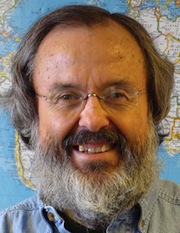By Telos Press · Wednesday, October 1, 2014 In this short video, filmed at the recent Telos Conference in L’Aquila, Editor Russell A. Berman talks about the central themes and concerns of Telos 168 (Fall 2014): The West: Its Past and Its Prospects. We have posted Russell’s full introduction here, and you can order your copy of the issue in our online store.
Continue reading →
By Telos Press · Monday, September 29, 2014  Congratulations to our own Tim Luke on receiving the American Political Science Association’s Charles A. McCoy Career Achievement Award, in honor of his many outstanding accomplishments as a writer, teacher, and activist. First starting with Telos as an intern back in 1975, Tim has been with the journal ever since, serving as an Associate Editor from the early 1980s on and as Telos Press Publishing’s Book Line Editor since 2005. In the latter role, Tim has overseen the publication of numerous Telos Press books, including the anthology A Journal of No Illusions: Telos, Paul Piccone, and the Americanization of Critical Theory, which he also coedited with Ben Agger. Virginia Tech, where Tim is University Distinguished Professor of Political Science as well as chair of the Department of Political Science, has a terrific write-up at their website, and we encourage everyone to read it. Congratulations to our own Tim Luke on receiving the American Political Science Association’s Charles A. McCoy Career Achievement Award, in honor of his many outstanding accomplishments as a writer, teacher, and activist. First starting with Telos as an intern back in 1975, Tim has been with the journal ever since, serving as an Associate Editor from the early 1980s on and as Telos Press Publishing’s Book Line Editor since 2005. In the latter role, Tim has overseen the publication of numerous Telos Press books, including the anthology A Journal of No Illusions: Telos, Paul Piccone, and the Americanization of Critical Theory, which he also coedited with Ben Agger. Virginia Tech, where Tim is University Distinguished Professor of Political Science as well as chair of the Department of Political Science, has a terrific write-up at their website, and we encourage everyone to read it.
Continue reading →
By Telos Press · Wednesday, September 24, 2014 On February 14–15, 2015, the Telos-Paul Piccone Institute will hold its annual conference in New York City. The theme of the conference will be “Universal History, Philosophical History, and the Fate of Humanity.” The deadline for abstract submissions has been extended until October 20, so if you missed last week’s deadline but still wish to present a paper, send your abstract (no more than 250 words) and a short c.v. to telosnyc@telosinstitute.net and place “The 2015 Telos Conference” in the email’s subject line. For the full call for papers and other details about the conference, please visit the conference page at the Telos-Paul Piccone Institute website.
Continue reading →
By Telos Press · Friday, September 19, 2014 Writing at the Financial Times today, Daniel Ben-Ami reviews Joel Kotkin’s The New Class Conflict, now available from Telos Press. Save 30% when you order your copy in our online store.
 Any serious attempt to understand the US’s current impasse by moving outside the conventional framework should be welcome. The stale pairings of liberal and conservative, right and left, no longer cut it. Any serious attempt to understand the US’s current impasse by moving outside the conventional framework should be welcome. The stale pairings of liberal and conservative, right and left, no longer cut it.
Joel Kotkin, an American academic and author, has come up with the unlikely proposal of understanding the country’s predicament in terms of class conflict. But his conception is a world away from the old socialist notion of a combative proletariat battling against an intransigent ruling class. Instead, his is an innovative attempt to rethink the main contours of US society.
Continue reading →
By Telos Press · Tuesday, September 9, 2014 Writing in today’s USA Today, Glenn Harlan Reynolds (aka Instapundit) reviews Joel Kotkin’s The New Class Conflict, just published by Telos Press. Order your copy in our online store.
 We’ve heard a lot of election-year class warfare talk, from makers vs. takers to the 1% vs. the 99%. But Joel Kotkin’s important new book, The New Class Conflict, suggests that America’s real class problems are deeper, and more damaging, than election rhetoric. We’ve heard a lot of election-year class warfare talk, from makers vs. takers to the 1% vs. the 99%. But Joel Kotkin’s important new book, The New Class Conflict, suggests that America’s real class problems are deeper, and more damaging, than election rhetoric.
Traditionally, America has been thought of as a place of great mobility—one where anyone can conceivably grow up to be president, regardless of background. This has never been entirely true, of course. Most of our presidents have come from reasonably well-off backgrounds, and even Barack Obama, a barrier-breaker in some ways, came from an affluent background and enjoyed an expensive private-school upbringing. But the problem Kotkin describes goes beyond shots at the White House. . . .
Continue reading →
By Telos Press · Tuesday, September 2, 2014  On the Liberty Law Talk podcast today, Joel Kotkin talks with host Richard Reinsch about The New Class Conflict, now available from Telos Press. It’s a smart, wide-ranging interview that covers many of the central issues Kotkin raises in his new book: the way that today’s high-tech oligarchy, unlike the early twenty-century industrial magnates, have amassed both financial and cultural power; the exacerbation of wealth inequality in places like California as a result of government bureaucratization; the consolidation of the media by coastal urban elites and the consequent effect on cultural perceptions; the control over both U.S. political parties by the wealthy and the resulting distortion of the democratic process; and a whole lot more. On the Liberty Law Talk podcast today, Joel Kotkin talks with host Richard Reinsch about The New Class Conflict, now available from Telos Press. It’s a smart, wide-ranging interview that covers many of the central issues Kotkin raises in his new book: the way that today’s high-tech oligarchy, unlike the early twenty-century industrial magnates, have amassed both financial and cultural power; the exacerbation of wealth inequality in places like California as a result of government bureaucratization; the consolidation of the media by coastal urban elites and the consequent effect on cultural perceptions; the control over both U.S. political parties by the wealthy and the resulting distortion of the democratic process; and a whole lot more.
Continue reading →
|
|
 Congratulations to our own Tim Luke on receiving the American Political Science Association’s Charles A. McCoy Career Achievement Award, in honor of his many outstanding accomplishments as a writer, teacher, and activist. First starting with Telos as an intern back in 1975, Tim has been with the journal ever since, serving as an Associate Editor from the early 1980s on and as Telos Press Publishing’s Book Line Editor since 2005. In the latter role, Tim has overseen the publication of numerous Telos Press books, including the anthology
Congratulations to our own Tim Luke on receiving the American Political Science Association’s Charles A. McCoy Career Achievement Award, in honor of his many outstanding accomplishments as a writer, teacher, and activist. First starting with Telos as an intern back in 1975, Tim has been with the journal ever since, serving as an Associate Editor from the early 1980s on and as Telos Press Publishing’s Book Line Editor since 2005. In the latter role, Tim has overseen the publication of numerous Telos Press books, including the anthology 


